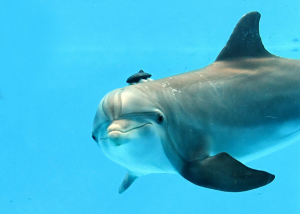Presented By: Michigan Robotics
Contextualized Monitoring in the Marine Environment
PhD Defense, Joaquin Gabaldon

Co-Chair:
Kira Barton & Alex Shorter
Abstract:
Marine mammal monitoring has seen improvements in the last few decades with advances made to both the monitoring hardware and post-processing computation methods. However, these improvements have primarily been focused on and implemented in wild animal tracking, with less attention paid to the managed environment. This is a particularly important deficiency, as the cooperative nature of institutionally managed animals allows for research on swimming kinematics and energetics behavior with an intricacy that is difficult to achieve in the wild. This dissertation uses robotics-inspired physical kinematics and localization techniques to address two primary limitations in marine mammal monitoring: 1) the lack of persistent, absolute estimates of animal swimming energetics and kinematics, and 2) the lack of a robust, precise localization method for managed cetaceans. To resolve these, the hardware and animal tracking methods developed to enable the rest of the dissertation are first defined. Next, a physics-based approach to directly monitor cetacean swimming energetics is both presented and implemented to study animal propulsion patterns under varying effort conditions. Finally, a high-fidelity 3D monitoring framework is introduced for tracking institutionally managed cetaceans, and is applied alongside the energetics estimation method to provide a first look at the potential of spatially-contextualized animal monitoring.
Kira Barton & Alex Shorter
Abstract:
Marine mammal monitoring has seen improvements in the last few decades with advances made to both the monitoring hardware and post-processing computation methods. However, these improvements have primarily been focused on and implemented in wild animal tracking, with less attention paid to the managed environment. This is a particularly important deficiency, as the cooperative nature of institutionally managed animals allows for research on swimming kinematics and energetics behavior with an intricacy that is difficult to achieve in the wild. This dissertation uses robotics-inspired physical kinematics and localization techniques to address two primary limitations in marine mammal monitoring: 1) the lack of persistent, absolute estimates of animal swimming energetics and kinematics, and 2) the lack of a robust, precise localization method for managed cetaceans. To resolve these, the hardware and animal tracking methods developed to enable the rest of the dissertation are first defined. Next, a physics-based approach to directly monitor cetacean swimming energetics is both presented and implemented to study animal propulsion patterns under varying effort conditions. Finally, a high-fidelity 3D monitoring framework is introduced for tracking institutionally managed cetaceans, and is applied alongside the energetics estimation method to provide a first look at the potential of spatially-contextualized animal monitoring.